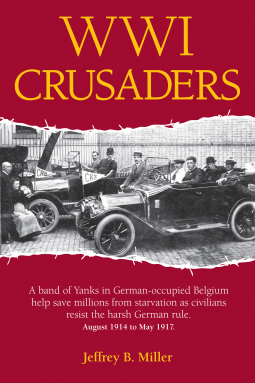
WWI Crusaders
A band of Yanks in German-occupied Belgium help save millions from starvation as civilians resist the harsh German rule. August 1914 to May 1917
by Jeffrey B. Miller
This title was previously available on NetGalley and is now archived.
Send NetGalley books directly to your Kindle or Kindle app
1
To read on a Kindle or Kindle app, please add kindle@netgalley.com as an approved email address to receive files in your Amazon account. Click here for step-by-step instructions.
2
Also find your Kindle email address within your Amazon account, and enter it here.
Pub Date Nov 11 2018 | Archive Date Nov 11 2018
Talking about this book? Use #Wwicrusaders #NetGalley. More hashtag tips!
Description
During WWI (1914-1918), the American-led Commission for Relief in Belgium (CRB) initiated, organized, and supervised the largest food relief program the world had ever seen. The CRB and its Belgian counterpart, the Comite National (CN), fed for four years nearly 10 million Belgians and northern French trapped behind German lines. Young, idealistic Americans volunteered to go into German-occupied Belgium to guarantee the relief food would not be taken by the Germans. These humanitarian crusaders had to maintain strict neutrality as they watched the Belgians suffer under the harsh German regime. WWI Crusaders is the first nonfiction book for general readers that tells in one volume the interlacing stories of German brutality, Belgian resistance, and the young Americans who went into German-occupied Belgium. The book covers August 1914 through May 1917, when the last Americans had to leave Belgium because of America’s April entry into the war. It is a story few have heard.
A Note From the Publisher
Author is available for interviews, blog tours, autographed tours, autographed book giveaways, contests, and book club discussions.
Marketing Plan
About the Author:
Jeffrey B. Miller has been a writer, editor, and author for more than 40 years. His career includes starting six magazines (city, regional, and national), being editor-in-chief of five inflight magazines, and director of communications for AAA Colorado. He is also the author of Stapleton International Airport: The First Fifty Years (Pruett Publishing, Boulder, CO, 1983); co-author with Dr. Gordon Ehlers of Facing Your Fifties: Every Man’s Reference to Mid-life Health (M. Evans & Co., New York, 2002), which was included in Publishers Weekly’s Best Books of 2002; and author of Behind the Lines (Milbrown Press, 2014), which detailed the chaotic beginnings of WWI Belgium food relief and was included in Kirkus Reviews’ Best Books of 2014.
Available Editions
| EDITION | Paperback |
| ISBN | 9990990689386 |
| PRICE | $24.95 (USD) |
Featured Reviews
 Terri W, Reviewer
Terri W, Reviewer
The famous German brutality of WWII was first practiced in Belgium during WWI. By the time of World War I, Belgium was the most industrialized country in Europe, and the most densely populated. It imported 75% of its food.
The Germans kicked off their war by marching through Belgium to get into France and capture Paris. They didn’t expect the Belgians to display nationalistic feeling when they were already divided ethnically, and the Germans were shocked when the Belgians resisted their advance.
Their occupation of Belgium became vicious. Men, women, and children were executed for resisting. Belgian industries were dismantled and transported to Germany, leaving massive unemployment in Belgium. Forty million francs per month was demanded as a contribution to the war. Thousands of men were deported for slave labor in Germany. Movement outside of one’s town or village was forbidden without difficult-to-obtain passes. Imports and exports were stopped, which meant starvation.
Belgian representatives traveled to London, looking for a way to avert the starvation of the country. Herbert Hoover, a wealthy American industrialist who was helping Americans stranded in Europe by the war, volunteered to lead the effort of getting food to Belgium. He was assisted by mostly young, adventurous men, many Rhodes scholars at Oxford.
Neither the British nor the Germans favored the relief effort. Both sides allowed it to continue because Hoover masterfully orchestrated a worldwide PR campaign to highlight the plight of the Belgians and gain universal sympathy that the belligerents couldn’t ignore.
When the American relief delegates had to leave Belgium in 1917 upon the US entry into the war, the still-neutral Netherlands and Spain kept the relief going to feed Belgium.
Fascinating account of Belgium’s WWI experience, much of which was unknown to me.



